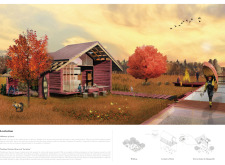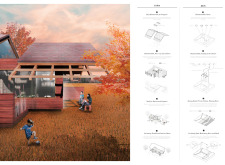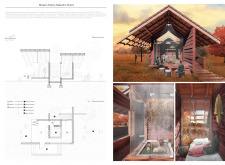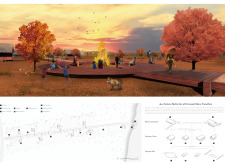5 key facts about this project
Levitation is located in Skrunda, Latvia, surrounded by one of Europe’s most vibrant natural environments, rich with rivers and greenery. The design is inspired by traditional Latvian houses that appear to float above the landscape. This concept aims to create cabins that foster a connection between architecture and the wild, allowing people to engage more deeply with nature.
Concept and Design Philosophy
The project revolves around the theme of levitation, reflecting both the vulnerabilities and strengths of the surrounding land. It recognizes challenges like flooding and uneven surfaces while promoting a relationship between humans and the wilderness. The design encourages interaction with the environment, presenting a light and approachable form rather than a bulky architectural presence.
Materiality and Construction
Disassembled wood serves as a primary material, bringing the floating cabins to life. This choice enhances the visual lightness and creates a sense of connection to the outdoors. The structures feature an exposed frame that invites natural light, making the interiors feel open and integrated with the outside world.
Outdoor Integration and Amenities
The layout encourages a blend of indoor and outdoor living, with cabin roof designs designed to let in sunlight and maintain a strong feeling of nature. Pathways provide easy access for guests, inviting them to explore the beautiful landscape while connecting to local routes for canoeing and hiking.
Each cabin includes various amenities to cater to both communal gatherings and private moments. There are private gardens, outdoor dining areas, and baths, allowing occupants to enjoy the outdoors in comfort. Features like an outdoor movie theater create chances for social interactions, balancing community life with personal space.
This careful approach ensures the cabins integrate into the landscape, with elements designed for functionality and to strengthen the connection between the occupants and the natural beauty of Latvia's wild environment.





















































